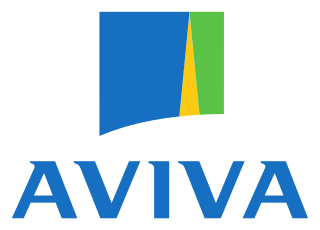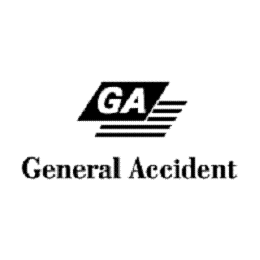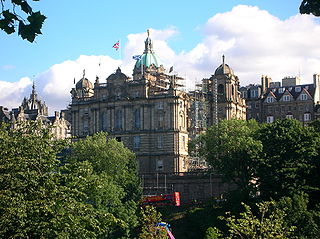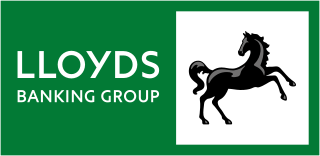
The Financial Times Stock Exchange 100 Index, also called the FTSE 100 Index, FTSE 100, FTSE, or, informally, the "Footsie", is the United Kingdom's best-known stock market index of the 100 most highly capitalised blue chip companies listed on the London Stock Exchange. Founded in 1984 by Stock Exchange to better reflect activity on the market, it replaced the Financial Times own FT 30. A new index afforded Stock Exchange the opportunity to launch the options contract derived from the FTSE's real-time data while competitors LIFFE launched the futures contract. With Margaret Thatcher's sweeping financial deregulation that culminated in the Big Bang the combination of a new index, LIFFE tradable derivatives and promotion by the Financial Times lead to the FTSE 100 becoming the most widely used barometer of whether the UK stock market was rising or falling.

Lloyds Bank plc is a British retail and commercial bank with branches across England and Wales. It has traditionally been considered one of the "Big Four" clearing banks. Lloyds Bank is the largest retail bank in Britain, and has an extensive network of branches and ATMs in England and Wales and offers 24-hour telephone and online banking services.

The Trustee Savings Bank (TSB) was a British financial institution that operated between 1810 and 1995 when it was merged with Lloyds Bank. Trustee savings banks originated to accept savings deposits from those with moderate means. Their shares were not traded on the stock market but, unlike mutually held building societies, depositors had no voting rights; nor did they have the power to direct the financial and managerial goals of the organisation. Directors were appointed as trustees on a voluntary basis. The first trustee savings bank was established by Rev. Henry Duncan of Ruthwell in Dumfriesshire for his poorest parishioners in 1810, with its sole purpose being to serve the local people in the community. Between 1970 and 1985, the various trustee savings banks in the United Kingdom were amalgamated into a single institution named TSB Group plc, which was floated on the London Stock Exchange. In 1995, the TSB merged with Lloyds Bank to form Lloyds TSB, at that point the largest bank in the UK by market share and the second-largest by market capitalisation.

Permanent TSB Group Holdings plc, formerly Irish Life and Permanent plc is a provider of personal financial services in Ireland. Irish Life Assurance plc and the Irish Permanent Building Society merged to form the Irish Life and Permanent Group in 1999 and the merged entity acquired the Trustee Savings Bank in 2001. The group has no connection to the UK's TSB Bank.

Allied Irish Banks, p.l.c. is one of the so-called Big Four commercial banks in the Republic of Ireland. AIB offers a full range of personal, business and corporate banking services. The bank also offers a range of general insurance products such as home, travel and car. It offers life assurance and pensions through its tied agency with Irish Life Assurance plc.

Aviva plc is a British multinational insurance company headquartered in London, England. It has about 18 million customers across its core markets of the United Kingdom, Ireland and Canada. In the United Kingdom, Aviva is the largest general insurer and a leading life and pensions provider. Aviva is also the second largest general insurer in Canada.

Prudential plc is a British multinational insurance company headquartered in London, England. It was founded in London in May 1848 to provide loans to professional and working people.

Zurich Insurance Group Ltd is a Swiss insurance company, headquartered in Zürich, and the country's largest insurer. As of 2021, the group is the world's 112th largest public company according to Forbes' Global 2000s list, and in 2011, it ranked 94th in Interbrand's top 100 brands.

Prudential Financial, Inc. is an American Fortune Global 500 and Fortune 500 company whose subsidiaries provide insurance, retirement planning, investment management, and other products and services to both retail and institutional customers throughout the United States and in over 40 other countries. In 2019, Prudential was the largest insurance provider in the United States with $815.1 billion in total assets.

The Canada Life Assurance Company, commonly known as Canada Life (Canada-Vie), is an insurance and financial services company with its headquarters in Winnipeg, Manitoba. The current company is the result of the 2020 amalgamation of The Great-West Life Assurance Company, London Life Insurance Company and The Canada Life Assurance Company, along with their holding companies. The company is a wholly owned subsidiary of Great-West Lifeco.
A Publicly-owned company is the name given in Ireland to a state-owned enterprise, that is to say, a commercial business which is beneficially owned, either completely or majority, by the Irish Government. Each state-sponsored body has a sponsor Minister who acts as shareholder, either independently, or in conjunction with the Minister for Finance, who may also be a shareholder. State-sponsored bodies are often popularly called semi-state companies, a misnomer, since they are all (mostly) fully owned by the state, in addition not all of them are actually companies.
Great-West Lifeco Inc. is a Canadian insurance-centered financial holding company that operates in North America, Europe and Asia through five wholly owned, regionally focused subsidiaries. Many of the companies it has indirect control over are part of its largest subsidiary, The Canada Life Assurance Company; the others are managed by Great-West Lifeco U.S. LLC, a U.S. based subsidiary. Great-West Lifeco is indirectly controlled by Montreal billionaire Paul Desmarais Jr. through his stake in the Power Corporation of Canada, which owns 72% of Great-West Lifeco. The hyphen in the company's name was originally a typesetter's error.

AIA Group Limited, often known as AIA, is a Hong Kong-based multinational insurance and finance corporation. It is the largest publicly listed life insurance group in Asia-Pacific. It offers insurance and financial services, writing life insurance for individuals and businesses, as well as accident and health insurance, and offers retirement planning, and wealth management services, variable contracts, investments and securities.

General Accident plc was a large insurance business based in Perth, Scotland. It merged with Commercial Union in 1998 to form CGU plc.

HBOS plc is a banking and insurance company in the United Kingdom, a wholly owned subsidiary of the Lloyds Banking Group, having been taken over in January 2009. It was the holding company for Bank of Scotland plc, which operated the Bank of Scotland and Halifax brands in the UK, as well as HBOS Australia and HBOS Insurance & Investment Group Limited, the group's insurance division.

Lloyds Banking Group plc is a British financial institution formed through the acquisition of HBOS by Lloyds TSB in 2009. It is one of the UK's largest financial services organisations, with 30 million customers and 65,000 employees. Lloyds Bank was founded in 1765 but the wider Group's heritage extends over 320 years, dating back to the founding of the Bank of Scotland by the Parliament of Scotland in 1695.

TSB Bank plc is a British retail and commercial bank based in Edinburgh, Scotland. It has been a subsidiary of Sabadell Group since 2015.

Corebridge Financial is an American multinational financial services company. It provides annuities, life insurance, asset management, retirement solutions, and other services. Corebridge was formed after AIG performed a spin-off on the company via an IPO in 2022.
















